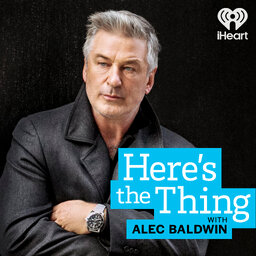Eric Ripert is Chef Par Excellence
Eric Ripert is chef and part-owner of one of New York’s flagship fine-dining establishments, Le Bernardin. For three decades with Ripert at the helm, Le Bernardin has ranked at the top of the world's best restaurant lists and holds three Michelin stars, the maximum available. Ripert is also the author of several cookbooks and a best-selling memoir – and was host of the Emmy-winning tv show “AVEC ERIC.” Ripert shares with Alec stories from his culinary training, how he maintains Le Bernardin's excellence, and the unmatched power of dessert.
In 1 playlist(s)
Here's The Thing with Alec Baldwin
Award-winning actor Alec Baldwin takes listeners into the lives of artists, policy makers and perfor…Social links
Follow podcast
Recent clips

Karina Canellakis - from Violinist to Conductor
47:32

From the Archives: Anjelica Huston on Modeling, Movie-Making, and a Life in the Spotlight
48:25

The Fearless Robbie Kaplan
42:32
 Here's The Thing with Alec Baldwin
Here's The Thing with Alec Baldwin